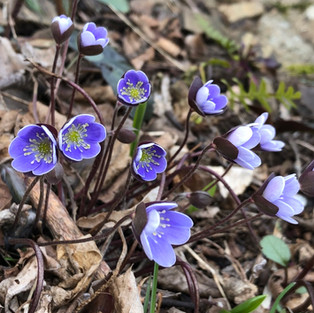More spring flowers blooming in the woods
- Lucy

- Apr 22, 2020
- 4 min read
Updated: Apr 16, 2025
With the exception of red trillium, you have to slow down to notice many of the early spring wildflowers in the woods. Stopping to look at the details of these flowers that brave the early spring weather is well worth your time. For me, the silver lining to this challenging time is that I have been able to visit several preserves and enjoy what I discovered.

red trillium
This year, the spring wildflowers have been amazing. I have never seen this many different wildflowers blooming at the same time. I see this in my yard too with daffodils and forsythia blooming for over a month.

round-lobed hepatica
In this part of Connecticut, hepatica, bloodroot and trout-lily (click here for blog on trout-lily) are usually the first to bloom. Hepatica gets its name because the 3 lobed leaves have a shape a bit like a liver. The flowers of this small plant range in comes in white and various shades of purple and pink. We know the plant in the photo is old because it had over 40 buds/blossoms. See below for more photos of hepatica.

Bloodroot
I love the way the leaves of bloodroot wrap around the bud and early flowers to protect them from damage. Often you see individual plants along a trail, but sometimes you get the treat of a big patch.

Bloodroot
The order of the plants in this blog is roughly the order they appear in the spring. Many are spring ephemerals which means they come up early and gather and store their energy in their roots before the trees leaf out. For some like trout-lily, there are no leaves or above ground sign of the plant by June.

Dutchmen's Breeches Photo by Sonya Wulff
This pretty plant with lacy leaves has an unusual shaped flower that looks a little like breeches (short trousers) hanging on a clothes line.

Rue Anemone Photo by Sonya Wulff
All of these early spring flowers depend on the native pollinators that come out on warmer days. These flowers generally have very specific needs and do not transplant well. Not only is it illegal to remove them from public land, but there is a good chance they will die in the transplanting process. Please do not dig them up. Please leave them for all to enjoy.

Spring Beauty
This sweet tiny flower, with grass like leaves, has little pink lines on the flower that guide the early pollinators to the center.
Red Trillium (see top photo) with its striking flower has 3 leaves. Unlike poison ivy, the leaves have no teeth and the stem is fleshy.

Wood anemone Photo by Sonya Wulff
The little white flowers of wood anemone are just starting to emerge from their pink buds.

Wild ginger
The distinctive, thick leaves of wild ginger hide the small red flower.
I hope you can get out and enjoy some of these brave beauties that come out in the early spring weather. When you come upon one, do take the time to look closely and appreciate the beauty. For deeper understanding and striking photos of these plants, see Spring Wildflowers of the Northeast by Carol Gracie.
Nature Nurture
I feel incredibly fortunate to live in a place where I can spend time outside. Nature is the place that nurtures me. It is a place where no social distancing is required from the many, many non-human living things. I am feeling grateful for spring. What are you grateful for?
Hepatica is one of my favorite flowers. They come in a variety of colors.
If you look closely the new stems, buds and leaves are covered with little hairs.
I have a favorite hepatica plant. She surrounded by moss at the base of an oak tree.
I enjoy watching the transformation from the hairy buds to flowers followed by the emergence of new leaves and seeds.
If you take the time to go back to the same plant every day (or every few days) at this time of year, it is amazing what you can discover. It is a gift to be able to wander in my yard and see the new sprouts coming up. I am looking forward to watching the unfurling of leaves that is about to happen. It is so easy to stay busy or get lost looking at a screen. If you want to increase your resiliency, treat yourself to time outside noticing all the magical changes that are happening now..
If you keep your eyes and ears open, it is amazing what you can discover!
Share what you notice with a family member, friend or neighbor.
Have you notice this plant popping up in many places? Like the trout lily there can be many plants with a single leaves in an area. I love how they will often follow a crack in a big rock. Keep your eye out for the little flower on the plants with 2 leaves.
Click here to subscribe to the EO Blogs and be notified when new blogs are published.




























Comments